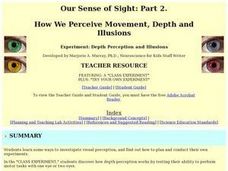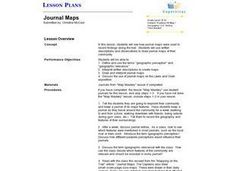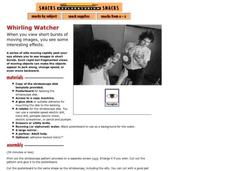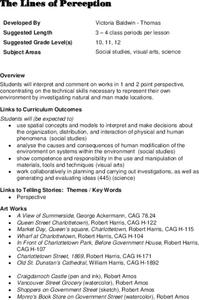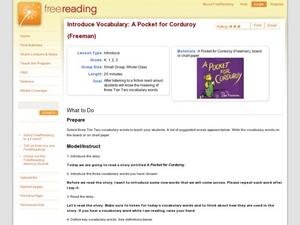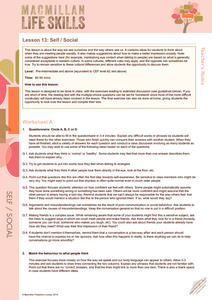Urbana School District
Light
You matter, unless you multiply yourself by the speed of light ... then you energy. Presentation covers the behavior of light as both a wave and a particle, light versus sound, space travel, why objects have colors, depth perception,...
Curated OER
Is Your Blue Really Blue? [Metamerism]
Young scholars learn fundamentals about color perception, and explain the phenomenon called "metamerism". Students learn the three basic components of color perception: light source, illuminated colored object, and the light detector.
Curated OER
How We Perceive Movement, Depth and Illusions
Students examine how depth perception works through a class experiment. They design and perform their own experiment that investigates visual illusions.
Curated OER
Optical Illusions
Learners investigate optical illusions. In this optical illusions lesson, students explore perception. Learners analyze optical illusions and determine common misconceptions.
Curated OER
How Media Shapes Perception
Young scholars explain the impact that the media may have in shaping their intellectual and emotional responses to current events. They examine broadcast and Web-based news sites to find subtexts through the use of language, audio, and...
Curated OER
Press Perception of Jack Johnson
Students role-play the role of journalists during the 19th and 20th centuries. They create their own sports newspapers. They report on Jack Johnson's life and career.
Edgate
Journal Maps
Inspire your class to look at their environments as if they were seeing them for the first time in order to gain a better understanding of the concept of perspective. After exploring their communities and keeping a journal of major...
Exploratorium
Far Out Corners
Construct a three-dimensional optical illusion when your class is exploring vision and how the eye and brain work together. Three concave corners are mounted inside of a black box, but as a light is shined upon them, they appear to be...
Exploratorium
Fading Dot
Fuzzy edges cause an image to fade from view in an activity intended to demonstrate how vision works.
Exploratorium
Whirling Watcher
Pupils put together their own stroboscopes so that they can observe how cyclically moving images appear to merge into a singular object. This, and several other activities published by the same source, illuminate the way the brain...
Exploratorium
Cheshire Cat
Divide your field of vision in two and see what happens when your two eyes behold two different scenes! This is a way to demonstrate to body-systems buffs how the two eyes usually blend pictures to create a three-dimensional view. This...
Exploratorium
Bird in the Cage
When your life science class is learning about the eye and how it works, you can add this activity as a demonstration of how the retina holds an afterimage. After staring at a red, green, or blue bird shape, pupils glance at a cage and...
C-SPAN
Survey Analysis- Public Perceptions of Voting and Elections
The perception of fairness in elections becomes more important with each passing election. Using data from a C-SPAN poll, budding historians consider the differences between how people perceive elections. The resource includes videos of...
Curated OER
The Lines of Perception
Students interpret and comment on works in 1 and 2 point perspective. They locate the focal point of works done in 1 point perspective and create a drawing of a street or landscape in their local area using 1 point perspective.
Curated OER
Persona in Autobiography
A talkative old man? A naïve believer in Human Perfectibility? A Sage? Who is this guy, anyway? The Autobiography of Benjamin Franklin launches a study of the way Franklin uses structure, style, and purpose, as well as different...
Curated OER
Introduce Vocabulary: A Pocket for Corduroy (Freeman)
Who doesn't love this book? A Pocket for Corduroy provides excellent vocabulary practice in context for budding readers (although this strategy could be used with any text). Before reading it aloud, go over the new terms: affectionate,...
Illustrative Mathematics
Naming the Whole for a Fraction
How many different ways can you represent a whole? In a picture that represents six parts (two of which are shaded), learners are asked to label the parts appropriately to show how three different mathematical interpretations can be...
Japan Society
The Russo-Japanese War, 1904-1905: A Turning Point in Japanese History, World History, and How War is Conveyed to the Public
The big question: How did Russo-Japanese War imagery and the press influence Japanese perception of the war? Learners consider this big question as they compare and contrast various artistic media from the period. The lesson is...
Macmillan Education
What Do You See?
Encourage learners to develop greater self-awareness and an understanding of perception versus reality. Here you'll find a life skills lesson that includes worksheets, discussion, and brainstorming activities on the topic of how we see...
Macmillan Education
Self/Social
Body language, our perception of others, and how to make a better impression socially are the focus topics for this lesson, which is part of a 23-lesson series on building important life skills. Learners complete a questionnaire on...
Have Fun Teaching
Synonyms (Thesaurus Search)
Smart, intelligent, perceptive. Here's a worksheet that asks kids to use a thesaurus (an online one, perhaps?) to find a series of synonyms for the six words listed.
Novelinks
The Little Prince: Response to Art Exercise
Depending on your perspective, solitude can be lovely or very, very lonely. Kids take a look at the simple landscape illustrated in Antoine de Saint Éxupery's The Little Prince, and write a short journal entry about their perception of...
Bowland
How Risky is Life?
"Life is more risk management, rather than exclusion of risks." -Walter Wriston. Scholars use provided mortality data to determine how likely it is a person will die from a particular cause. They compare the data to the perception of the...
Society for Science & the Public
Easter Islanders Made Tools, Not War
When studying artifacts, especially tools, how do archaeologists determine what the devices were used for? In what ways might researchers' previous experiences influence their perception of an artifact? An article about researchers'...
Other popular searches
- Sensation and Perception
- Visual Perception
- Depth Perception
- Perception of Ethnic Groups
- Perception First Impressions
- Color Perception
- Tactile Perception
- Psychology Perception
- Cultural Perception
- Culture and Perception
- Visual Perception Activities
- Perception Illustration



![Is Your Blue Really Blue? [Metamerism] Lesson Plan Is Your Blue Really Blue? [Metamerism] Lesson Plan](http://content.lessonplanet.com/resources/thumbnails/94747/large/bwluav9tywdpy2symde4mtixny0zmdywos1smnd6dxauanbn.jpg?1545052463)
